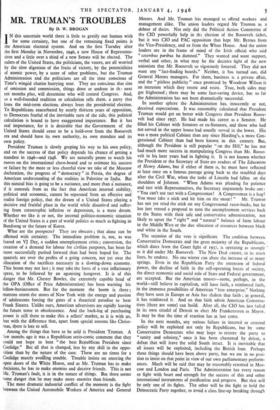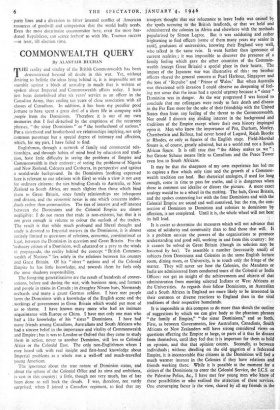MR. TRUMAN'S TROUBLES
1 N this uncertain world there is little to gratify our human wish 1 for some certainty, but one of the remaining fixed points is the American electoral system. And on the first Tuesday after the first Monday in November, 1946, a new House of Representa- tives and a little over a third of a new Senate will be elected. The rulers of the United States, the politicians, the voters, are all worried by the slow digestion of the fruits of victory, by the potentialities of atomic power, by a score of other problems, but the Truman Administration and the politicians are all the time conscious of Time's wing6c1 chariot hurrying near. They are conscious that sins of omission and commission, things done or undone in th: next ten- months plus, will determine who will control Congress. And, so a well-founded tradition or calculation tells them, a party that loses the mid-term elections always loses the presidential election. To Republicans exacerbated by nearly thirteen years of opposition, to Democrats fearful of the inevitable turn of the tide, this political calculation is bound to have exaggerated importance. But it has real importance, for it is desirable that the Government of the United States should cease to be a hold-over from the Roosevelt era and should have its own authority, its own mandate and its own policy.
President Truman is slowly groping his way to his own policy, and on the success of that policy depends his chance of getting a mandate in 1946—and 1948. We are naturally prone to watch his moves on the international chess-board and to estimate his success or failure by the more or less cheerful view we take of the Moscow declaration, the progress of " democracy " in Persia, the degree of American understanding of the realities in Palestine or India. But this natural bias is going to be a nuisance, and more than a nuisance, if it conceals from us the fact that American internal stability, political and economic, cannot be separated from an effective and realist foreign policy, that the dream of a United States playing a decisive and fruitful place in the world while disunited and suffer- ing from catastrophic inflation or depression, is a mere dream. Whether we like it or not, the internal politico-economic situation of the United States is a part of world politics as much as fighting in Bandoeng or the future of Korea.
What are the prospects? They are obscure ; that alone can be affirmed with certainty. The immediate problem is, not, as was feared on VJ Day, a sudden unemployment crisis ; conversion, the creation of a demand for labour for civilian purposes, has been far more successfully pushed forward than had been hoped for. The quarrels are over -the profits of a going concern, not yet over the allocation of the sacrifices necessary in a slowing-down economy. This boom may not last ; it may take the form of a vast inflationary spree, to be followed by an agonising hangover. It is of this danger that Mr. Chester Bowles, the extremely capable head of the OPA (Office of Price Administration) has been warning his fellow-businessmen. But for the moment the boom is there ; matrons storm the stores of New York with the energy and passion of adolescents forcing the gates of a theatrical paradise to hear Frank Sinatra. Unlike ours, American advertisers are rapidly leaving the future tense to obsolescence. And the back-log of purchasing power is still there to make this a sellers' market, as it is with us, but with the difference that, apart from special seasons like Christ- mas, tbere is lots to sell.
Among the things that have to be sold is President Truman. A few months ago it was a Republican serio-comic comment that they could not hope to beat " the best Republican President since Coolidge." But all that is changed, less by any skill in the oppo- sition than by the nature of the case. These are no times for a Coolidge mutely avoiding trouble. Trouble insists on entering the open doors of the White House, and as Mr. Truman has to make decisions, he has to make enemies and deceive friends. This is not Mr. Truman's fault, it is in the nature of things. But there seems some danger that he may make more enemies than friends.
The most dramatic industrial conflict of the moment is the fight between the,United Automobile Workers of America and General Motors. And Mr. Truman has managed to offend workers and management alike. The union leaders regard Mr Truman as a debtor of theirs. Not only did the Political Action Committee of the CIO powerfully help in th:• election of the Roosevelt ticket, but it was CIO and PAC opposition that kept Mr. Byrnes from the Vice-Presidency, and so from the White House. And the union leaders are in the frame of mind of the Irish official who said " ceteribus paribus be damned." They wanted and want support, verbal and other, in what may be the decisive fight of the new unionism that Mr. Roosevelt so vigorously fostered. They did not want any " fact-finding boards." Neither, it has turned out, did General Motors managers. For them, business, is a private affair, and the " pitiless publicity " once promised by Woodrow Wilson is an intrusion which they resent and resist. True, both sides may get frightened ; there may be some face-saving device, but so far the Administration has not been dramatically successful.
In another sphere the Administration has, innocently or not, deceived expectations. It was reasonably calculated that President Truman would get on better with Congress than President Roose- velt had since 1937. He had made his career as a Senator. He filled his Cabinet with Senators or ex-Senators, and those who had not served in the upper house had usually served in the lower. His was a more political Cabinet than any since Harding's, a more Con- gressional Cabinet than had been known in this century. But, although the President is still popular " on the Hill," he has not had much more success in manipulating Congress than Mr. Roose- velt in his later years had in fighting it. It is not known whether the President or the Secretary of State are readers of The Education of Henry Adams, but if either of them is, he must have reflected at least once on a famous passage going back to the troubled days after the Civil War, when the tasks of Lincoln had fallen on the shoulders of Johnson. " When Adams was pleading for patience and tact with Representatives, the Secretary impatiently broke out: " You can't use tact with a Congressman! A Congressman is a hog!
You must take a stick and hit him on the snout! " Mr. Truman has not yet tried the stick on any Congressional razor-backs, but he has just vetoed a proposal to turn the unemployment services back to the States with their safe and conservative administration, not likely to upset the " right " and "natural " balance of farm labour in the Middle West or the due allocation of resources between black and white in the South.
The occasion of the veto is significant. The coalition between Conservative Democrats and the great majority of the Republicans, which dates from the Court fight of 1937, is operating as strongly ' as it did under Mr. Roosevelt. The New Deal cannot, in its main lines, be undone. No one winter can abate the increase of so many springs. Even in the Republican Party the extension of federal power, the decline of faith in the self-operating forces of society, the direct economic and social role of State and Federal government, are accepted. But the American masses—alone, perhaps, in the world—still believe in capitalism, still have faith, a reinforced faith, in the immense possibilities of American " free enterprise." Nothing they have seen in Europe or Asia has shaken that faith ; in general, it has reinforced it. And on that faith adroit American Conserva- tives (there are some) can build. After all, the CIO has just failed in its own citadel of Detroit to elect Mr Frankensteen as Mayor. It may be that the time of reaction has at last come.
In the next months, any serious failure in internal or external policy will. be exploited not only by Republicans, but by some Conservative Democrats who may hope to restore the party to " sanity and sobriety," once it has been chastened by defeat, a defeat that will leave the solid South intact. It is inevitable that all issues will be exploited, including the British loan. Perhaps these things should have been above party, but we are in no posi- tion to insist on that point in view of our own parliamentary perform- ances. Much will be said that may be reasonably resented in Mos- cow and London and Paris. The Administration has every reason to fight with heart and strength for the success of this and other international instruments of pacification and progress. But that will be only one of its fights. The other will be the fight to hold the Democratic Party together, to avoid a class line-up breaking through • party lines and a diversion to bitter internal conflict of American resources of goodwill and competence that the world badly needs. Even the most doctrinaire corinnentator here, evert the most har- dened Republican, can scarce forbeat to wish Mr. Truman success --at least, till election time.
































 Previous page
Previous page